

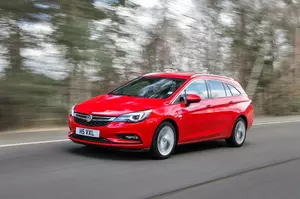
2019 Astra Mk VII Sports Tourer (facelift 2019)

2019 Astra Mk VII (facelift 2019)
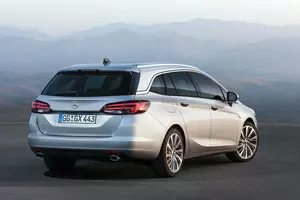
2015 Astra Mk VII Sports Tourer
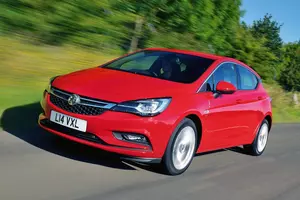
2015 Astra Mk VII
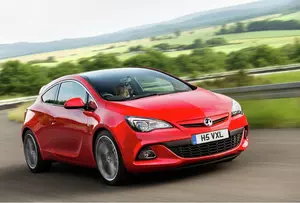
2011 Astra Mk VI GTC
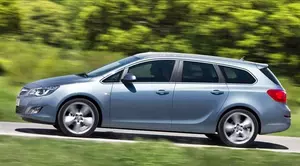
2010 Astra Mk VI Sports Tourer
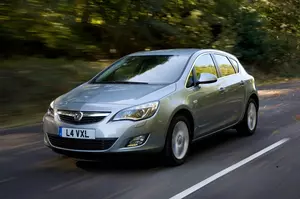
2009 Astra Mk VI CC

2006 Astra Mk V Convertible
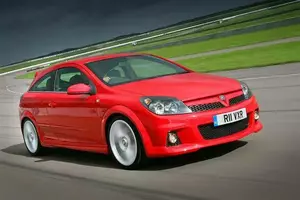
2005 Astra Mk V CC Sport Hatch
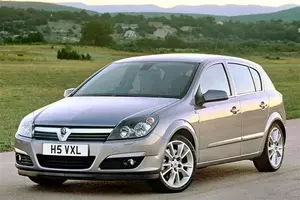
2004 Astra Mk V CC
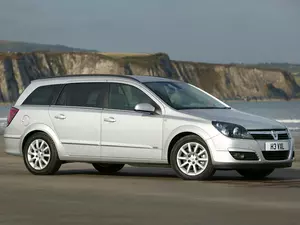
2004 Astra Mk V Estate
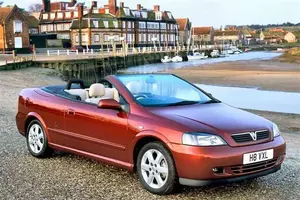
2002 Astra Mk IV Convertible
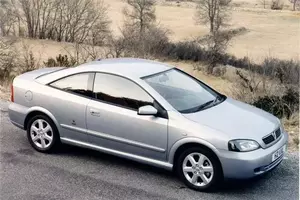
2002 Astra Mk IV Coupe
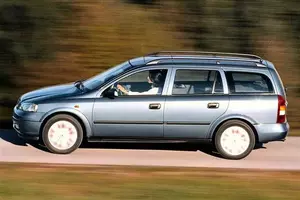
1998 Astra Mk IV Estate
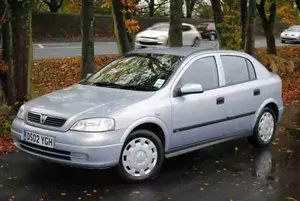
1998 Astra Mk IV
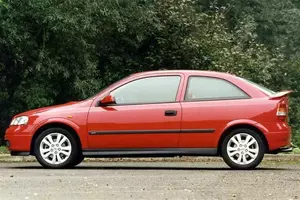
1998 Astra Mk IV CC

1991 Astra Mk III
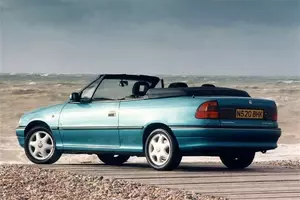
1993 Astra Mk III Convertible

1991 Astra Mk III Estate
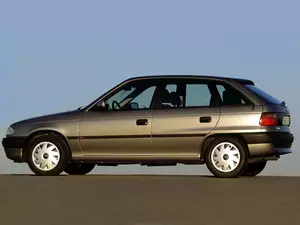
1991 Astra Mk III CC

1984 Astra Mk II Estate
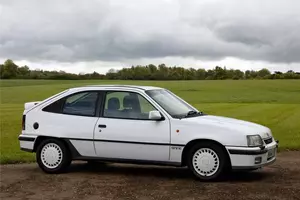
1984 Astra Mk II CC

1987 Astra Mk II Convertible

1985 Astra Mk II Belmont

| Vehicle | Precise engine size | Difference from world average | Engine size to consumption ratio | Horsepower from 1 L | Engine size to 100 kg of weight |
|---|---|---|---|---|---|
| 1.2 Turbo |
1.2 L (1199 cc) |
48.9% smaller | - | 108 hp from 1 L | - |
| 1.5 Turbo D |
1.5 L (1496 cc) |
36.2% smaller | - | 81 hp from 1 L | - |
| 1.4 Turbo |
1.34 L (1342 cc) |
42.8% smaller | - | 108 hp from 1 L | - |
| Vehicle | 1.2 Turbo |
|---|---|
| Precise engine size | 1.2 L (1199 cc) |
| Difference from world average | 48.9 smaller |
| Engine size to consumption ratio | - |
| Horsepower from 1 L | 108 hp from 1 L |
| Engine size to 100 kg of weight | - |
| Vehicle | 1.5 Turbo D |
| Precise engine size | 1.5 L (1496 cc) |
| Difference from world average | 36.2 smaller |
| Engine size to consumption ratio | - |
| Horsepower from 1 L | 81 hp from 1 L |
| Engine size to 100 kg of weight | - |
| Vehicle | 1.4 Turbo |
| Precise engine size | 1.34 L (1342 cc) |
| Difference from world average | 42.8 smaller |
| Engine size to consumption ratio | - |
| Horsepower from 1 L | 108 hp from 1 L |
| Engine size to 100 kg of weight | - |

| Vehicle | Precise engine size | Difference from world average | Engine size to consumption ratio | Horsepower from 1 L | Engine size to 100 kg of weight |
|---|---|---|---|---|---|
| 1.2 Turbo |
1.2 L (1199 cc) |
48.9% smaller | - | 121 hp from 1 L | - |
| 1.4 Turbo |
1.34 L (1342 cc) |
42.8% smaller | - | 108 hp from 1 L | - |
| 1.5 Turbo D |
1.5 L (1496 cc) |
36.2% smaller | - | 81 hp from 1 L | - |
| Vehicle | 1.2 Turbo |
|---|---|
| Precise engine size | 1.2 L (1199 cc) |
| Difference from world average | 48.9 smaller |
| Engine size to consumption ratio | - |
| Horsepower from 1 L | 121 hp from 1 L |
| Engine size to 100 kg of weight | - |
| Vehicle | 1.4 Turbo |
| Precise engine size | 1.34 L (1342 cc) |
| Difference from world average | 42.8 smaller |
| Engine size to consumption ratio | - |
| Horsepower from 1 L | 108 hp from 1 L |
| Engine size to 100 kg of weight | - |
| Vehicle | 1.5 Turbo D |
| Precise engine size | 1.5 L (1496 cc) |
| Difference from world average | 36.2 smaller |
| Engine size to consumption ratio | - |
| Horsepower from 1 L | 81 hp from 1 L |
| Engine size to 100 kg of weight | - |

| Vehicle | Precise engine size | Difference from world average | Engine size to consumption ratio | Horsepower from 1 L | Engine size to 100 kg of weight |
|---|---|---|---|---|---|
| 1.6 CDTi |
1.6 L (1598 cc) |
31.9% smaller | 31 cc to 1 mpg | 85 hp from 1 L | 114 cc to 100 kg |
| 1.4 |
1.4 L (1399 cc) |
40.4% smaller | 33 cc to 1 mpg | 71 hp from 1 L | 117 cc to 100 kg |
| 1.6 EcoTec |
1.6 L (1598 cc) |
31.9% smaller | 42 cc to 1 mpg | 125 hp from 1 L | 123 cc to 100 kg |
| 1.4 EcoTec |
1.4 L (1399 cc) |
40.4% smaller | 33 cc to 1 mpg | 89 hp from 1 L | 117 cc to 100 kg |
| 1.0i |
1 L (999 cc) |
57.4% smaller | 19 cc to 1 mpg | 105 hp from 1 L | 83 cc to 100 kg |
| Vehicle | 1.6 CDTi |
|---|---|
| Precise engine size | 1.6 L (1598 cc) |
| Difference from world average | 31.9 smaller |
| Engine size to consumption ratio | 31 cc to 1 mpg |
| Horsepower from 1 L | 85 hp from 1 L |
| Engine size to 100 kg of weight | 114 cc to 100 kg |
| Vehicle | 1.4 |
| Precise engine size | 1.4 L (1399 cc) |
| Difference from world average | 40.4 smaller |
| Engine size to consumption ratio | 33 cc to 1 mpg |
| Horsepower from 1 L | 71 hp from 1 L |
| Engine size to 100 kg of weight | 117 cc to 100 kg |
| Vehicle | 1.6 EcoTec |
| Precise engine size | 1.6 L (1598 cc) |
| Difference from world average | 31.9 smaller |
| Engine size to consumption ratio | 42 cc to 1 mpg |
| Horsepower from 1 L | 125 hp from 1 L |
| Engine size to 100 kg of weight | 123 cc to 100 kg |
| Vehicle | 1.4 EcoTec |
| Precise engine size | 1.4 L (1399 cc) |
| Difference from world average | 40.4 smaller |
| Engine size to consumption ratio | 33 cc to 1 mpg |
| Horsepower from 1 L | 89 hp from 1 L |
| Engine size to 100 kg of weight | 117 cc to 100 kg |
| Vehicle | 1.0i |
| Precise engine size | 1 L (999 cc) |
| Difference from world average | 57.4 smaller |
| Engine size to consumption ratio | 19 cc to 1 mpg |
| Horsepower from 1 L | 105 hp from 1 L |
| Engine size to 100 kg of weight | 83 cc to 100 kg |

| Vehicle | Precise engine size | Difference from world average | Engine size to consumption ratio | Horsepower from 1 L | Engine size to 100 kg of weight |
|---|---|---|---|---|---|
| 1.0 EcoTec |
1 L (999 cc) |
57.4% smaller | 19 cc to 1 mpg | 105 hp from 1 L | 83 cc to 100 kg |
| 1.6 CDTi |
1.6 L (1598 cc) |
31.9% smaller | 27 cc to 1 mpg | 85 hp from 1 L | 114 cc to 100 kg |
| 1.4 EcoTec |
1.4 L (1399 cc) |
40.4% smaller | 33 cc to 1 mpg | 89 hp from 1 L | 117 cc to 100 kg |
| 1.6 EcoTec |
1.6 L (1598 cc) |
31.9% smaller | 41 cc to 1 mpg | 125 hp from 1 L | 123 cc to 100 kg |
| 1.4 |
1.4 L (1399 cc) |
40.4% smaller | 32 cc to 1 mpg | 71 hp from 1 L | 117 cc to 100 kg |
| Vehicle | 1.0 EcoTec |
|---|---|
| Precise engine size | 1 L (999 cc) |
| Difference from world average | 57.4 smaller |
| Engine size to consumption ratio | 19 cc to 1 mpg |
| Horsepower from 1 L | 105 hp from 1 L |
| Engine size to 100 kg of weight | 83 cc to 100 kg |
| Vehicle | 1.6 CDTi |
| Precise engine size | 1.6 L (1598 cc) |
| Difference from world average | 31.9 smaller |
| Engine size to consumption ratio | 27 cc to 1 mpg |
| Horsepower from 1 L | 85 hp from 1 L |
| Engine size to 100 kg of weight | 114 cc to 100 kg |
| Vehicle | 1.4 EcoTec |
| Precise engine size | 1.4 L (1399 cc) |
| Difference from world average | 40.4 smaller |
| Engine size to consumption ratio | 33 cc to 1 mpg |
| Horsepower from 1 L | 89 hp from 1 L |
| Engine size to 100 kg of weight | 117 cc to 100 kg |
| Vehicle | 1.6 EcoTec |
| Precise engine size | 1.6 L (1598 cc) |
| Difference from world average | 31.9 smaller |
| Engine size to consumption ratio | 41 cc to 1 mpg |
| Horsepower from 1 L | 125 hp from 1 L |
| Engine size to 100 kg of weight | 123 cc to 100 kg |
| Vehicle | 1.4 |
| Precise engine size | 1.4 L (1399 cc) |
| Difference from world average | 40.4 smaller |
| Engine size to consumption ratio | 32 cc to 1 mpg |
| Horsepower from 1 L | 71 hp from 1 L |
| Engine size to 100 kg of weight | 117 cc to 100 kg |

| Vehicle | Precise engine size | Difference from world average | Engine size to consumption ratio | Horsepower from 1 L | Engine size to 100 kg of weight |
|---|---|---|---|---|---|
| 1.4 EcoFLEX |
1.4 L (1398 cc) |
40.4% smaller | 35 cc to 1 mpg | 86 hp from 1 L | 108 cc to 100 kg |
| 2.0 CDTi |
1.96 L (1956 cc) |
16.6% smaller | 40 cc to 1 mpg | 84 hp from 1 L | 150 cc to 100 kg |
| VXR 2.0i |
1.96 L (1956 cc) |
16.6% smaller | 67 cc to 1 mpg | 143 hp from 1 L | 140 cc to 100 kg |
| 1.7 CDTi |
1.69 L (1686 cc) |
28.1% smaller | 32 cc to 1 mpg | 77 hp from 1 L | 130 cc to 100 kg |
| 1.6 |
1.6 L (1598 cc) |
31.9% smaller | 53 cc to 1 mpg | 113 hp from 1 L | 123 cc to 100 kg |
| Vehicle | 1.4 EcoFLEX |
|---|---|
| Precise engine size | 1.4 L (1398 cc) |
| Difference from world average | 40.4 smaller |
| Engine size to consumption ratio | 35 cc to 1 mpg |
| Horsepower from 1 L | 86 hp from 1 L |
| Engine size to 100 kg of weight | 108 cc to 100 kg |
| Vehicle | 2.0 CDTi |
| Precise engine size | 1.96 L (1956 cc) |
| Difference from world average | 16.6 smaller |
| Engine size to consumption ratio | 40 cc to 1 mpg |
| Horsepower from 1 L | 84 hp from 1 L |
| Engine size to 100 kg of weight | 150 cc to 100 kg |
| Vehicle | VXR 2.0i |
| Precise engine size | 1.96 L (1956 cc) |
| Difference from world average | 16.6 smaller |
| Engine size to consumption ratio | 67 cc to 1 mpg |
| Horsepower from 1 L | 143 hp from 1 L |
| Engine size to 100 kg of weight | 140 cc to 100 kg |
| Vehicle | 1.7 CDTi |
| Precise engine size | 1.69 L (1686 cc) |
| Difference from world average | 28.1 smaller |
| Engine size to consumption ratio | 32 cc to 1 mpg |
| Horsepower from 1 L | 77 hp from 1 L |
| Engine size to 100 kg of weight | 130 cc to 100 kg |
| Vehicle | 1.6 |
| Precise engine size | 1.6 L (1598 cc) |
| Difference from world average | 31.9 smaller |
| Engine size to consumption ratio | 53 cc to 1 mpg |
| Horsepower from 1 L | 113 hp from 1 L |
| Engine size to 100 kg of weight | 123 cc to 100 kg |

| Vehicle | Precise engine size | Difference from world average | Engine size to consumption ratio | Horsepower from 1 L | Engine size to 100 kg of weight |
|---|---|---|---|---|---|
| 1.4 VVT |
1.4 L (1398 cc) |
40.4% smaller | 36 cc to 1 mpg | 100 hp from 1 L | 100 cc to 100 kg |
| 1.3 CDTI |
1.25 L (1248 cc) |
46.8% smaller | 22 cc to 1 mpg | 76 hp from 1 L | 89 cc to 100 kg |
| 1.6 CDTi |
1.69 L (1686 cc) |
28.1% smaller | 28 cc to 1 mpg | 80 hp from 1 L | 112 cc to 100 kg |
| 1.6i |
1.6 L (1598 cc) |
31.9% smaller | 50 cc to 1 mpg | 113 hp from 1 L | 107 cc to 100 kg |
| 1.6 VVT |
1.6 L (1598 cc) |
31.9% smaller | 46 cc to 1 mpg | 72 hp from 1 L | 123 cc to 100 kg |
| 1.7 CDTI |
1.69 L (1686 cc) |
28.1% smaller | 32 cc to 1 mpg | 65 hp from 1 L | 84 cc to 100 kg |
| 2.0 CDTI |
1.96 L (1956 cc) |
16.6% smaller | 43 cc to 1 mpg | 82 hp from 1 L | 140 cc to 100 kg |
| Vehicle | 1.4 VVT |
|---|---|
| Precise engine size | 1.4 L (1398 cc) |
| Difference from world average | 40.4 smaller |
| Engine size to consumption ratio | 36 cc to 1 mpg |
| Horsepower from 1 L | 100 hp from 1 L |
| Engine size to 100 kg of weight | 100 cc to 100 kg |
| Vehicle | 1.3 CDTI |
| Precise engine size | 1.25 L (1248 cc) |
| Difference from world average | 46.8 smaller |
| Engine size to consumption ratio | 22 cc to 1 mpg |
| Horsepower from 1 L | 76 hp from 1 L |
| Engine size to 100 kg of weight | 89 cc to 100 kg |
| Vehicle | 1.6 CDTi |
| Precise engine size | 1.69 L (1686 cc) |
| Difference from world average | 28.1 smaller |
| Engine size to consumption ratio | 28 cc to 1 mpg |
| Horsepower from 1 L | 80 hp from 1 L |
| Engine size to 100 kg of weight | 112 cc to 100 kg |
| Vehicle | 1.6i |
| Precise engine size | 1.6 L (1598 cc) |
| Difference from world average | 31.9 smaller |
| Engine size to consumption ratio | 50 cc to 1 mpg |
| Horsepower from 1 L | 113 hp from 1 L |
| Engine size to 100 kg of weight | 107 cc to 100 kg |
| Vehicle | 1.6 VVT |
| Precise engine size | 1.6 L (1598 cc) |
| Difference from world average | 31.9 smaller |
| Engine size to consumption ratio | 46 cc to 1 mpg |
| Horsepower from 1 L | 72 hp from 1 L |
| Engine size to 100 kg of weight | 123 cc to 100 kg |
| Vehicle | 1.7 CDTI |
| Precise engine size | 1.69 L (1686 cc) |
| Difference from world average | 28.1 smaller |
| Engine size to consumption ratio | 32 cc to 1 mpg |
| Horsepower from 1 L | 65 hp from 1 L |
| Engine size to 100 kg of weight | 84 cc to 100 kg |
| Vehicle | 2.0 CDTI |
| Precise engine size | 1.96 L (1956 cc) |
| Difference from world average | 16.6 smaller |
| Engine size to consumption ratio | 43 cc to 1 mpg |
| Horsepower from 1 L | 82 hp from 1 L |
| Engine size to 100 kg of weight | 140 cc to 100 kg |

| Vehicle | Precise engine size | Difference from world average | Engine size to consumption ratio | Horsepower from 1 L | Engine size to 100 kg of weight |
|---|---|---|---|---|---|
| 1.4 EcoFLEX |
1.4 L (1398 cc) |
40.4% smaller | 33 cc to 1 mpg | 62 hp from 1 L | 108 cc to 100 kg |
| 1.7 CDTi |
1.69 L (1686 cc) |
28.1% smaller | 34 cc to 1 mpg | 74 hp from 1 L | 120 cc to 100 kg |
| 1.6 Ecotec |
1.6 L (1598 cc) |
31.9% smaller | 47 cc to 1 mpg | 72 hp from 1 L | 123 cc to 100 kg |
| 1.4 Ecotec |
1.4 L (1398 cc) |
40.4% smaller | 35 cc to 1 mpg | 100 hp from 1 L | 108 cc to 100 kg |
| 1.6 CDTi |
1.6 L (1598 cc) |
31.9% smaller | 27 cc to 1 mpg | 85 hp from 1 L | 114 cc to 100 kg |
| Vehicle | 1.4 EcoFLEX |
|---|---|
| Precise engine size | 1.4 L (1398 cc) |
| Difference from world average | 40.4 smaller |
| Engine size to consumption ratio | 33 cc to 1 mpg |
| Horsepower from 1 L | 62 hp from 1 L |
| Engine size to 100 kg of weight | 108 cc to 100 kg |
| Vehicle | 1.7 CDTi |
| Precise engine size | 1.69 L (1686 cc) |
| Difference from world average | 28.1 smaller |
| Engine size to consumption ratio | 34 cc to 1 mpg |
| Horsepower from 1 L | 74 hp from 1 L |
| Engine size to 100 kg of weight | 120 cc to 100 kg |
| Vehicle | 1.6 Ecotec |
| Precise engine size | 1.6 L (1598 cc) |
| Difference from world average | 31.9 smaller |
| Engine size to consumption ratio | 47 cc to 1 mpg |
| Horsepower from 1 L | 72 hp from 1 L |
| Engine size to 100 kg of weight | 123 cc to 100 kg |
| Vehicle | 1.4 Ecotec |
| Precise engine size | 1.4 L (1398 cc) |
| Difference from world average | 40.4 smaller |
| Engine size to consumption ratio | 35 cc to 1 mpg |
| Horsepower from 1 L | 100 hp from 1 L |
| Engine size to 100 kg of weight | 108 cc to 100 kg |
| Vehicle | 1.6 CDTi |
| Precise engine size | 1.6 L (1598 cc) |
| Difference from world average | 31.9 smaller |
| Engine size to consumption ratio | 27 cc to 1 mpg |
| Horsepower from 1 L | 85 hp from 1 L |
| Engine size to 100 kg of weight | 114 cc to 100 kg |

| Vehicle | Precise engine size | Difference from world average | Engine size to consumption ratio | Horsepower from 1 L | Engine size to 100 kg of weight |
|---|---|---|---|---|---|
| 1.9 CDTi |
1.91 L (1910 cc) |
18.6% smaller | 49 cc to 1 mpg | 79 hp from 1 L | 112 cc to 100 kg |
| 1.6 |
1.6 L (1598 cc) |
31.9% smaller | 47 cc to 1 mpg | 66 hp from 1 L | 114 cc to 100 kg |
| 2.0 |
2 L (1998 cc) |
14.8% smaller | 80 cc to 1 mpg | 100 hp from 1 L | 125 cc to 100 kg |
| 1.8 |
1.8 L (1796 cc) |
23.4% smaller | 62 cc to 1 mpg | 78 hp from 1 L | 112 cc to 100 kg |
| Vehicle | 1.9 CDTi |
|---|---|
| Precise engine size | 1.91 L (1910 cc) |
| Difference from world average | 18.6 smaller |
| Engine size to consumption ratio | 49 cc to 1 mpg |
| Horsepower from 1 L | 79 hp from 1 L |
| Engine size to 100 kg of weight | 112 cc to 100 kg |
| Vehicle | 1.6 |
| Precise engine size | 1.6 L (1598 cc) |
| Difference from world average | 31.9 smaller |
| Engine size to consumption ratio | 47 cc to 1 mpg |
| Horsepower from 1 L | 66 hp from 1 L |
| Engine size to 100 kg of weight | 114 cc to 100 kg |
| Vehicle | 2.0 |
| Precise engine size | 2 L (1998 cc) |
| Difference from world average | 14.8 smaller |
| Engine size to consumption ratio | 80 cc to 1 mpg |
| Horsepower from 1 L | 100 hp from 1 L |
| Engine size to 100 kg of weight | 125 cc to 100 kg |
| Vehicle | 1.8 |
| Precise engine size | 1.8 L (1796 cc) |
| Difference from world average | 23.4 smaller |
| Engine size to consumption ratio | 62 cc to 1 mpg |
| Horsepower from 1 L | 78 hp from 1 L |
| Engine size to 100 kg of weight | 112 cc to 100 kg |

| Vehicle | Precise engine size | Difference from world average | Engine size to consumption ratio | Horsepower from 1 L | Engine size to 100 kg of weight |
|---|---|---|---|---|---|
| 1.7 CDTi |
1.69 L (1686 cc) |
28.1% smaller | 36 cc to 1 mpg | 59 hp from 1 L | 130 cc to 100 kg |
| 1.9 CDTi |
1.91 L (1910 cc) |
18.6% smaller | 47 cc to 1 mpg | 63 hp from 1 L | 147 cc to 100 kg |
| 1.8 VVT 16V |
1.8 L (1796 cc) |
23.4% smaller | 56 cc to 1 mpg | 78 hp from 1 L | 150 cc to 100 kg |
| 2.0i |
2 L (1998 cc) |
14.8% smaller | 77 cc to 1 mpg | 85 hp from 1 L | 154 cc to 100 kg |
| 1.4i 16V |
1.36 L (1364 cc) |
41.9% smaller | 37 cc to 1 mpg | 66 hp from 1 L | 114 cc to 100 kg |
| 1.8i |
1.8 L (1796 cc) |
23.4% smaller | 62 cc to 1 mpg | 69 hp from 1 L | 150 cc to 100 kg |
| 1.6i 16V |
1.6 L (1598 cc) |
31.9% smaller | 44 cc to 1 mpg | 66 hp from 1 L | 133 cc to 100 kg |
| 1.6i |
1.6 L (1598 cc) |
31.9% smaller | 52 cc to 1 mpg | 113 hp from 1 L | 123 cc to 100 kg |
| Vehicle | 1.7 CDTi |
|---|---|
| Precise engine size | 1.69 L (1686 cc) |
| Difference from world average | 28.1 smaller |
| Engine size to consumption ratio | 36 cc to 1 mpg |
| Horsepower from 1 L | 59 hp from 1 L |
| Engine size to 100 kg of weight | 130 cc to 100 kg |
| Vehicle | 1.9 CDTi |
| Precise engine size | 1.91 L (1910 cc) |
| Difference from world average | 18.6 smaller |
| Engine size to consumption ratio | 47 cc to 1 mpg |
| Horsepower from 1 L | 63 hp from 1 L |
| Engine size to 100 kg of weight | 147 cc to 100 kg |
| Vehicle | 1.8 VVT 16V |
| Precise engine size | 1.8 L (1796 cc) |
| Difference from world average | 23.4 smaller |
| Engine size to consumption ratio | 56 cc to 1 mpg |
| Horsepower from 1 L | 78 hp from 1 L |
| Engine size to 100 kg of weight | 150 cc to 100 kg |
| Vehicle | 2.0i |
| Precise engine size | 2 L (1998 cc) |
| Difference from world average | 14.8 smaller |
| Engine size to consumption ratio | 77 cc to 1 mpg |
| Horsepower from 1 L | 85 hp from 1 L |
| Engine size to 100 kg of weight | 154 cc to 100 kg |
| Vehicle | 1.4i 16V |
| Precise engine size | 1.36 L (1364 cc) |
| Difference from world average | 41.9 smaller |
| Engine size to consumption ratio | 37 cc to 1 mpg |
| Horsepower from 1 L | 66 hp from 1 L |
| Engine size to 100 kg of weight | 114 cc to 100 kg |
| Vehicle | 1.8i |
| Precise engine size | 1.8 L (1796 cc) |
| Difference from world average | 23.4 smaller |
| Engine size to consumption ratio | 62 cc to 1 mpg |
| Horsepower from 1 L | 69 hp from 1 L |
| Engine size to 100 kg of weight | 150 cc to 100 kg |
| Vehicle | 1.6i 16V |
| Precise engine size | 1.6 L (1598 cc) |
| Difference from world average | 31.9 smaller |
| Engine size to consumption ratio | 44 cc to 1 mpg |
| Horsepower from 1 L | 66 hp from 1 L |
| Engine size to 100 kg of weight | 133 cc to 100 kg |
| Vehicle | 1.6i |
| Precise engine size | 1.6 L (1598 cc) |
| Difference from world average | 31.9 smaller |
| Engine size to consumption ratio | 52 cc to 1 mpg |
| Horsepower from 1 L | 113 hp from 1 L |
| Engine size to 100 kg of weight | 123 cc to 100 kg |

| Vehicle | Precise engine size | Difference from world average | Engine size to consumption ratio | Horsepower from 1 L | Engine size to 100 kg of weight |
|---|---|---|---|---|---|
| 1.4 |
1.36 L (1364 cc) |
41.9% smaller | 37 cc to 1 mpg | 66 hp from 1 L | 114 cc to 100 kg |
| 2.0 |
2 L (1998 cc) |
14.8% smaller | 77 cc to 1 mpg | 85 hp from 1 L | 154 cc to 100 kg |
| 1.3 CDTi |
1.25 L (1248 cc) |
46.8% smaller | 25 cc to 1 mpg | 72 hp from 1 L | 96 cc to 100 kg |
| 1.6 |
1.6 L (1598 cc) |
31.9% smaller | 44 cc to 1 mpg | 66 hp from 1 L | 133 cc to 100 kg |
| 1.8 |
1.8 L (1796 cc) |
23.4% smaller | 56 cc to 1 mpg | 69 hp from 1 L | 150 cc to 100 kg |
| 1.8 VVT 16V |
1.8 L (1796 cc) |
23.4% smaller | 56 cc to 1 mpg | 78 hp from 1 L | 150 cc to 100 kg |
| 1.7 CDTi |
1.69 L (1686 cc) |
28.1% smaller | 35 cc to 1 mpg | 59 hp from 1 L | 130 cc to 100 kg |
| 1.9 CDTi |
1.91 L (1910 cc) |
18.6% smaller | 47 cc to 1 mpg | 79 hp from 1 L | 147 cc to 100 kg |
| Vehicle | 1.4 |
|---|---|
| Precise engine size | 1.36 L (1364 cc) |
| Difference from world average | 41.9 smaller |
| Engine size to consumption ratio | 37 cc to 1 mpg |
| Horsepower from 1 L | 66 hp from 1 L |
| Engine size to 100 kg of weight | 114 cc to 100 kg |
| Vehicle | 2.0 |
| Precise engine size | 2 L (1998 cc) |
| Difference from world average | 14.8 smaller |
| Engine size to consumption ratio | 77 cc to 1 mpg |
| Horsepower from 1 L | 85 hp from 1 L |
| Engine size to 100 kg of weight | 154 cc to 100 kg |
| Vehicle | 1.3 CDTi |
| Precise engine size | 1.25 L (1248 cc) |
| Difference from world average | 46.8 smaller |
| Engine size to consumption ratio | 25 cc to 1 mpg |
| Horsepower from 1 L | 72 hp from 1 L |
| Engine size to 100 kg of weight | 96 cc to 100 kg |
| Vehicle | 1.6 |
| Precise engine size | 1.6 L (1598 cc) |
| Difference from world average | 31.9 smaller |
| Engine size to consumption ratio | 44 cc to 1 mpg |
| Horsepower from 1 L | 66 hp from 1 L |
| Engine size to 100 kg of weight | 133 cc to 100 kg |
| Vehicle | 1.8 |
| Precise engine size | 1.8 L (1796 cc) |
| Difference from world average | 23.4 smaller |
| Engine size to consumption ratio | 56 cc to 1 mpg |
| Horsepower from 1 L | 69 hp from 1 L |
| Engine size to 100 kg of weight | 150 cc to 100 kg |
| Vehicle | 1.8 VVT 16V |
| Precise engine size | 1.8 L (1796 cc) |
| Difference from world average | 23.4 smaller |
| Engine size to consumption ratio | 56 cc to 1 mpg |
| Horsepower from 1 L | 78 hp from 1 L |
| Engine size to 100 kg of weight | 150 cc to 100 kg |
| Vehicle | 1.7 CDTi |
| Precise engine size | 1.69 L (1686 cc) |
| Difference from world average | 28.1 smaller |
| Engine size to consumption ratio | 35 cc to 1 mpg |
| Horsepower from 1 L | 59 hp from 1 L |
| Engine size to 100 kg of weight | 130 cc to 100 kg |
| Vehicle | 1.9 CDTi |
| Precise engine size | 1.91 L (1910 cc) |
| Difference from world average | 18.6 smaller |
| Engine size to consumption ratio | 47 cc to 1 mpg |
| Horsepower from 1 L | 79 hp from 1 L |
| Engine size to 100 kg of weight | 147 cc to 100 kg |

| Vehicle | Precise engine size | Difference from world average | Engine size to consumption ratio | Horsepower from 1 L | Engine size to 100 kg of weight |
|---|---|---|---|---|---|
| 1.7 CDTi |
1.69 L (1686 cc) |
28.1% smaller | 34 cc to 1 mpg | 47 hp from 1 L | 130 cc to 100 kg |
| 2.0 |
2 L (1998 cc) |
14.8% smaller | 77 cc to 1 mpg | 85 hp from 1 L | 133 cc to 100 kg |
| 1.6 |
1.6 L (1598 cc) |
31.9% smaller | 46 cc to 1 mpg | 66 hp from 1 L | 133 cc to 100 kg |
| 1.3 CDTi |
1.25 L (1248 cc) |
46.8% smaller | 25 cc to 1 mpg | 72 hp from 1 L | 96 cc to 100 kg |
| 1.8 VVT 16V |
1.8 L (1796 cc) |
23.4% smaller | 60 cc to 1 mpg | 78 hp from 1 L | 138 cc to 100 kg |
| 1.9 CDTi |
1.91 L (1910 cc) |
18.6% smaller | 44 cc to 1 mpg | 63 hp from 1 L | 136 cc to 100 kg |
| 1.8 |
1.8 L (1796 cc) |
23.4% smaller | 62 cc to 1 mpg | 69 hp from 1 L | 138 cc to 100 kg |
| 1.4 |
1.36 L (1364 cc) |
41.9% smaller | 37 cc to 1 mpg | 66 hp from 1 L | 114 cc to 100 kg |
| Vehicle | 1.7 CDTi |
|---|---|
| Precise engine size | 1.69 L (1686 cc) |
| Difference from world average | 28.1 smaller |
| Engine size to consumption ratio | 34 cc to 1 mpg |
| Horsepower from 1 L | 47 hp from 1 L |
| Engine size to 100 kg of weight | 130 cc to 100 kg |
| Vehicle | 2.0 |
| Precise engine size | 2 L (1998 cc) |
| Difference from world average | 14.8 smaller |
| Engine size to consumption ratio | 77 cc to 1 mpg |
| Horsepower from 1 L | 85 hp from 1 L |
| Engine size to 100 kg of weight | 133 cc to 100 kg |
| Vehicle | 1.6 |
| Precise engine size | 1.6 L (1598 cc) |
| Difference from world average | 31.9 smaller |
| Engine size to consumption ratio | 46 cc to 1 mpg |
| Horsepower from 1 L | 66 hp from 1 L |
| Engine size to 100 kg of weight | 133 cc to 100 kg |
| Vehicle | 1.3 CDTi |
| Precise engine size | 1.25 L (1248 cc) |
| Difference from world average | 46.8 smaller |
| Engine size to consumption ratio | 25 cc to 1 mpg |
| Horsepower from 1 L | 72 hp from 1 L |
| Engine size to 100 kg of weight | 96 cc to 100 kg |
| Vehicle | 1.8 VVT 16V |
| Precise engine size | 1.8 L (1796 cc) |
| Difference from world average | 23.4 smaller |
| Engine size to consumption ratio | 60 cc to 1 mpg |
| Horsepower from 1 L | 78 hp from 1 L |
| Engine size to 100 kg of weight | 138 cc to 100 kg |
| Vehicle | 1.9 CDTi |
| Precise engine size | 1.91 L (1910 cc) |
| Difference from world average | 18.6 smaller |
| Engine size to consumption ratio | 44 cc to 1 mpg |
| Horsepower from 1 L | 63 hp from 1 L |
| Engine size to 100 kg of weight | 136 cc to 100 kg |
| Vehicle | 1.8 |
| Precise engine size | 1.8 L (1796 cc) |
| Difference from world average | 23.4 smaller |
| Engine size to consumption ratio | 62 cc to 1 mpg |
| Horsepower from 1 L | 69 hp from 1 L |
| Engine size to 100 kg of weight | 138 cc to 100 kg |
| Vehicle | 1.4 |
| Precise engine size | 1.36 L (1364 cc) |
| Difference from world average | 41.9 smaller |
| Engine size to consumption ratio | 37 cc to 1 mpg |
| Horsepower from 1 L | 66 hp from 1 L |
| Engine size to 100 kg of weight | 114 cc to 100 kg |

| Vehicle | Precise engine size | Difference from world average | Engine size to consumption ratio | Horsepower from 1 L | Engine size to 100 kg of weight |
|---|---|---|---|---|---|
| 2.2 16V |
2.2 L (2198 cc) |
6.3% smaller | 76 cc to 1 mpg | 67 hp from 1 L | - |
| 2.2 DTi |
2.17 L (2172 cc) |
7.4% smaller | 59 cc to 1 mpg | 58 hp from 1 L | - |
| 1.6 16V |
1.6 L (1598 cc) |
31.9% smaller | 46 cc to 1 mpg | 64 hp from 1 L | - |
| 1.8 16V |
1.8 L (1796 cc) |
23.4% smaller | 58 cc to 1 mpg | 69 hp from 1 L | - |
| 2.0 16V |
2 L (1998 cc) |
14.8% smaller | 77 cc to 1 mpg | 95 hp from 1 L | - |
| Vehicle | 2.2 16V |
|---|---|
| Precise engine size | 2.2 L (2198 cc) |
| Difference from world average | 6.3 smaller |
| Engine size to consumption ratio | 76 cc to 1 mpg |
| Horsepower from 1 L | 67 hp from 1 L |
| Engine size to 100 kg of weight | - |
| Vehicle | 2.2 DTi |
| Precise engine size | 2.17 L (2172 cc) |
| Difference from world average | 7.4 smaller |
| Engine size to consumption ratio | 59 cc to 1 mpg |
| Horsepower from 1 L | 58 hp from 1 L |
| Engine size to 100 kg of weight | - |
| Vehicle | 1.6 16V |
| Precise engine size | 1.6 L (1598 cc) |
| Difference from world average | 31.9 smaller |
| Engine size to consumption ratio | 46 cc to 1 mpg |
| Horsepower from 1 L | 64 hp from 1 L |
| Engine size to 100 kg of weight | - |
| Vehicle | 1.8 16V |
| Precise engine size | 1.8 L (1796 cc) |
| Difference from world average | 23.4 smaller |
| Engine size to consumption ratio | 58 cc to 1 mpg |
| Horsepower from 1 L | 69 hp from 1 L |
| Engine size to 100 kg of weight | - |
| Vehicle | 2.0 16V |
| Precise engine size | 2 L (1998 cc) |
| Difference from world average | 14.8 smaller |
| Engine size to consumption ratio | 77 cc to 1 mpg |
| Horsepower from 1 L | 95 hp from 1 L |
| Engine size to 100 kg of weight | - |

| Vehicle | Precise engine size | Difference from world average | Engine size to consumption ratio | Horsepower from 1 L | Engine size to 100 kg of weight |
|---|---|---|---|---|---|
| 1.8 16V |
1.8 L (1796 cc) |
23.4% smaller | 60 cc to 1 mpg | 64 hp from 1 L | 163 cc to 100 kg |
| 2.0 16V Turbo |
2 L (1998 cc) |
14.8% smaller | 74 cc to 1 mpg | 95 hp from 1 L | 167 cc to 100 kg |
| 2.2 16V |
2.2 L (2198 cc) |
6.3% smaller | 79 cc to 1 mpg | 67 hp from 1 L | 183 cc to 100 kg |
| Vehicle | 1.8 16V |
|---|---|
| Precise engine size | 1.8 L (1796 cc) |
| Difference from world average | 23.4 smaller |
| Engine size to consumption ratio | 60 cc to 1 mpg |
| Horsepower from 1 L | 64 hp from 1 L |
| Engine size to 100 kg of weight | 163 cc to 100 kg |
| Vehicle | 2.0 16V Turbo |
| Precise engine size | 2 L (1998 cc) |
| Difference from world average | 14.8 smaller |
| Engine size to consumption ratio | 74 cc to 1 mpg |
| Horsepower from 1 L | 95 hp from 1 L |
| Engine size to 100 kg of weight | 167 cc to 100 kg |
| Vehicle | 2.2 16V |
| Precise engine size | 2.2 L (2198 cc) |
| Difference from world average | 6.3 smaller |
| Engine size to consumption ratio | 79 cc to 1 mpg |
| Horsepower from 1 L | 67 hp from 1 L |
| Engine size to 100 kg of weight | 183 cc to 100 kg |

| Vehicle | Precise engine size | Difference from world average | Engine size to consumption ratio | Horsepower from 1 L | Engine size to 100 kg of weight |
|---|---|---|---|---|---|
| 1.2 16V |
1.2 L (1199 cc) |
48.9% smaller | 32 cc to 1 mpg | 54 hp from 1 L | 109 cc to 100 kg |
| 1.6 16V |
1.6 L (1598 cc) |
31.9% smaller | - | 63 hp from 1 L | 133 cc to 100 kg |
| 1.4 16V |
1.36 L (1364 cc) |
41.9% smaller | - | 66 hp from 1 L | - |
| 1.7 DTI 16V |
1.69 L (1686 cc) |
28.1% smaller | 35 cc to 1 mpg | 44 hp from 1 L | 141 cc to 100 kg |
| 2.0 16V |
2 L (1998 cc) |
14.8% smaller | 74 cc to 1 mpg | 68 hp from 1 L | 167 cc to 100 kg |
| 1.8 16V |
1.8 L (1796 cc) |
23.4% smaller | 62 cc to 1 mpg | 64 hp from 1 L | 150 cc to 100 kg |
| 1.7 TD |
1.7 L (1700 cc) |
27.5% smaller | 44 cc to 1 mpg | 40 hp from 1 L | 142 cc to 100 kg |
| 2.0 DI |
2 L (1995 cc) |
15% smaller | 51 cc to 1 mpg | 41 hp from 1 L | 166 cc to 100 kg |
| 2.0 DTI 16V |
2 L (1995 cc) |
15% smaller | 50 cc to 1 mpg | 51 hp from 1 L | 153 cc to 100 kg |
| Vehicle | 1.2 16V |
|---|---|
| Precise engine size | 1.2 L (1199 cc) |
| Difference from world average | 48.9 smaller |
| Engine size to consumption ratio | 32 cc to 1 mpg |
| Horsepower from 1 L | 54 hp from 1 L |
| Engine size to 100 kg of weight | 109 cc to 100 kg |
| Vehicle | 1.6 16V |
| Precise engine size | 1.6 L (1598 cc) |
| Difference from world average | 31.9 smaller |
| Engine size to consumption ratio | - |
| Horsepower from 1 L | 63 hp from 1 L |
| Engine size to 100 kg of weight | 133 cc to 100 kg |
| Vehicle | 1.4 16V |
| Precise engine size | 1.36 L (1364 cc) |
| Difference from world average | 41.9 smaller |
| Engine size to consumption ratio | - |
| Horsepower from 1 L | 66 hp from 1 L |
| Engine size to 100 kg of weight | - |
| Vehicle | 1.7 DTI 16V |
| Precise engine size | 1.69 L (1686 cc) |
| Difference from world average | 28.1 smaller |
| Engine size to consumption ratio | 35 cc to 1 mpg |
| Horsepower from 1 L | 44 hp from 1 L |
| Engine size to 100 kg of weight | 141 cc to 100 kg |
| Vehicle | 2.0 16V |
| Precise engine size | 2 L (1998 cc) |
| Difference from world average | 14.8 smaller |
| Engine size to consumption ratio | 74 cc to 1 mpg |
| Horsepower from 1 L | 68 hp from 1 L |
| Engine size to 100 kg of weight | 167 cc to 100 kg |
| Vehicle | 1.8 16V |
| Precise engine size | 1.8 L (1796 cc) |
| Difference from world average | 23.4 smaller |
| Engine size to consumption ratio | 62 cc to 1 mpg |
| Horsepower from 1 L | 64 hp from 1 L |
| Engine size to 100 kg of weight | 150 cc to 100 kg |
| Vehicle | 1.7 TD |
| Precise engine size | 1.7 L (1700 cc) |
| Difference from world average | 27.5 smaller |
| Engine size to consumption ratio | 44 cc to 1 mpg |
| Horsepower from 1 L | 40 hp from 1 L |
| Engine size to 100 kg of weight | 142 cc to 100 kg |
| Vehicle | 2.0 DI |
| Precise engine size | 2 L (1995 cc) |
| Difference from world average | 15 smaller |
| Engine size to consumption ratio | 51 cc to 1 mpg |
| Horsepower from 1 L | 41 hp from 1 L |
| Engine size to 100 kg of weight | 166 cc to 100 kg |
| Vehicle | 2.0 DTI 16V |
| Precise engine size | 2 L (1995 cc) |
| Difference from world average | 15 smaller |
| Engine size to consumption ratio | 50 cc to 1 mpg |
| Horsepower from 1 L | 51 hp from 1 L |
| Engine size to 100 kg of weight | 153 cc to 100 kg |

| Vehicle | Precise engine size | Difference from world average | Engine size to consumption ratio | Horsepower from 1 L | Engine size to 100 kg of weight |
|---|---|---|---|---|---|
| 1.7 DTi 16V |
1.69 L (1686 cc) |
28.1% smaller | 34 cc to 1 mpg | 44 hp from 1 L | 141 cc to 100 kg |
| 1.6 16V |
1.6 L (1598 cc) |
31.9% smaller | 52 cc to 1 mpg | 63 hp from 1 L | 145 cc to 100 kg |
| 1.6 |
1.6 L (1598 cc) |
31.9% smaller | 48 cc to 1 mpg | 47 hp from 1 L | 145 cc to 100 kg |
| 1.7 TD |
1.7 L (1700 cc) |
27.5% smaller | 43 cc to 1 mpg | 40 hp from 1 L | 155 cc to 100 kg |
| 1.8 16V |
1.8 L (1796 cc) |
23.4% smaller | 60 cc to 1 mpg | 64 hp from 1 L | 163 cc to 100 kg |
| 2.0 16V |
2 L (1998 cc) |
14.8% smaller | 74 cc to 1 mpg | 68 hp from 1 L | 182 cc to 100 kg |
| 2.0 Di |
2 L (1995 cc) |
15% smaller | 57 cc to 1 mpg | 41 hp from 1 L | 166 cc to 100 kg |
| 2.0 DTi 16V |
2 L (1995 cc) |
15% smaller | 49 cc to 1 mpg | 50 hp from 1 L | 166 cc to 100 kg |
| Vehicle | 1.7 DTi 16V |
|---|---|
| Precise engine size | 1.69 L (1686 cc) |
| Difference from world average | 28.1 smaller |
| Engine size to consumption ratio | 34 cc to 1 mpg |
| Horsepower from 1 L | 44 hp from 1 L |
| Engine size to 100 kg of weight | 141 cc to 100 kg |
| Vehicle | 1.6 16V |
| Precise engine size | 1.6 L (1598 cc) |
| Difference from world average | 31.9 smaller |
| Engine size to consumption ratio | 52 cc to 1 mpg |
| Horsepower from 1 L | 63 hp from 1 L |
| Engine size to 100 kg of weight | 145 cc to 100 kg |
| Vehicle | 1.6 |
| Precise engine size | 1.6 L (1598 cc) |
| Difference from world average | 31.9 smaller |
| Engine size to consumption ratio | 48 cc to 1 mpg |
| Horsepower from 1 L | 47 hp from 1 L |
| Engine size to 100 kg of weight | 145 cc to 100 kg |
| Vehicle | 1.7 TD |
| Precise engine size | 1.7 L (1700 cc) |
| Difference from world average | 27.5 smaller |
| Engine size to consumption ratio | 43 cc to 1 mpg |
| Horsepower from 1 L | 40 hp from 1 L |
| Engine size to 100 kg of weight | 155 cc to 100 kg |
| Vehicle | 1.8 16V |
| Precise engine size | 1.8 L (1796 cc) |
| Difference from world average | 23.4 smaller |
| Engine size to consumption ratio | 60 cc to 1 mpg |
| Horsepower from 1 L | 64 hp from 1 L |
| Engine size to 100 kg of weight | 163 cc to 100 kg |
| Vehicle | 2.0 16V |
| Precise engine size | 2 L (1998 cc) |
| Difference from world average | 14.8 smaller |
| Engine size to consumption ratio | 74 cc to 1 mpg |
| Horsepower from 1 L | 68 hp from 1 L |
| Engine size to 100 kg of weight | 182 cc to 100 kg |
| Vehicle | 2.0 Di |
| Precise engine size | 2 L (1995 cc) |
| Difference from world average | 15 smaller |
| Engine size to consumption ratio | 57 cc to 1 mpg |
| Horsepower from 1 L | 41 hp from 1 L |
| Engine size to 100 kg of weight | 166 cc to 100 kg |
| Vehicle | 2.0 DTi 16V |
| Precise engine size | 2 L (1995 cc) |
| Difference from world average | 15 smaller |
| Engine size to consumption ratio | 49 cc to 1 mpg |
| Horsepower from 1 L | 50 hp from 1 L |
| Engine size to 100 kg of weight | 166 cc to 100 kg |

| Vehicle | Precise engine size | Difference from world average | Engine size to consumption ratio | Horsepower from 1 L | Engine size to 100 kg of weight |
|---|---|---|---|---|---|
| 1.2 16V |
1.2 L (1199 cc) |
48.9% smaller | 32 cc to 1 mpg | 54 hp from 1 L | 120 cc to 100 kg |
| 1.4 16V |
1.36 L (1364 cc) |
41.9% smaller | - | 66 hp from 1 L | 124 cc to 100 kg |
| 1.6 |
1.6 L (1598 cc) |
31.9% smaller | - | 47 hp from 1 L | 145 cc to 100 kg |
| 1.6 16V |
1.6 L (1598 cc) |
31.9% smaller | 47 cc to 1 mpg | 63 hp from 1 L | 145 cc to 100 kg |
| 1.8 16V |
1.8 L (1796 cc) |
23.4% smaller | 60 cc to 1 mpg | 64 hp from 1 L | 163 cc to 100 kg |
| 2.0 DI |
2 L (1995 cc) |
15% smaller | 49 cc to 1 mpg | 41 hp from 1 L | 166 cc to 100 kg |
| 1.7 DTI 16V |
1.69 L (1686 cc) |
28.1% smaller | - | 44 hp from 1 L | - |
| 2.0 16V |
2 L (1998 cc) |
14.8% smaller | 74 cc to 1 mpg | 68 hp from 1 L | 182 cc to 100 kg |
| 1.7 TD |
1.69 L (1686 cc) |
28.1% smaller | 42 cc to 1 mpg | 40 hp from 1 L | 153 cc to 100 kg |
| 2.0 DTI 16V |
2 L (1995 cc) |
15% smaller | 48 cc to 1 mpg | 51 hp from 1 L | 153 cc to 100 kg |
| Vehicle | 1.2 16V |
|---|---|
| Precise engine size | 1.2 L (1199 cc) |
| Difference from world average | 48.9 smaller |
| Engine size to consumption ratio | 32 cc to 1 mpg |
| Horsepower from 1 L | 54 hp from 1 L |
| Engine size to 100 kg of weight | 120 cc to 100 kg |
| Vehicle | 1.4 16V |
| Precise engine size | 1.36 L (1364 cc) |
| Difference from world average | 41.9 smaller |
| Engine size to consumption ratio | - |
| Horsepower from 1 L | 66 hp from 1 L |
| Engine size to 100 kg of weight | 124 cc to 100 kg |
| Vehicle | 1.6 |
| Precise engine size | 1.6 L (1598 cc) |
| Difference from world average | 31.9 smaller |
| Engine size to consumption ratio | - |
| Horsepower from 1 L | 47 hp from 1 L |
| Engine size to 100 kg of weight | 145 cc to 100 kg |
| Vehicle | 1.6 16V |
| Precise engine size | 1.6 L (1598 cc) |
| Difference from world average | 31.9 smaller |
| Engine size to consumption ratio | 47 cc to 1 mpg |
| Horsepower from 1 L | 63 hp from 1 L |
| Engine size to 100 kg of weight | 145 cc to 100 kg |
| Vehicle | 1.8 16V |
| Precise engine size | 1.8 L (1796 cc) |
| Difference from world average | 23.4 smaller |
| Engine size to consumption ratio | 60 cc to 1 mpg |
| Horsepower from 1 L | 64 hp from 1 L |
| Engine size to 100 kg of weight | 163 cc to 100 kg |
| Vehicle | 2.0 DI |
| Precise engine size | 2 L (1995 cc) |
| Difference from world average | 15 smaller |
| Engine size to consumption ratio | 49 cc to 1 mpg |
| Horsepower from 1 L | 41 hp from 1 L |
| Engine size to 100 kg of weight | 166 cc to 100 kg |
| Vehicle | 1.7 DTI 16V |
| Precise engine size | 1.69 L (1686 cc) |
| Difference from world average | 28.1 smaller |
| Engine size to consumption ratio | - |
| Horsepower from 1 L | 44 hp from 1 L |
| Engine size to 100 kg of weight | - |
| Vehicle | 2.0 16V |
| Precise engine size | 2 L (1998 cc) |
| Difference from world average | 14.8 smaller |
| Engine size to consumption ratio | 74 cc to 1 mpg |
| Horsepower from 1 L | 68 hp from 1 L |
| Engine size to 100 kg of weight | 182 cc to 100 kg |
| Vehicle | 1.7 TD |
| Precise engine size | 1.69 L (1686 cc) |
| Difference from world average | 28.1 smaller |
| Engine size to consumption ratio | 42 cc to 1 mpg |
| Horsepower from 1 L | 40 hp from 1 L |
| Engine size to 100 kg of weight | 153 cc to 100 kg |
| Vehicle | 2.0 DTI 16V |
| Precise engine size | 2 L (1995 cc) |
| Difference from world average | 15 smaller |
| Engine size to consumption ratio | 48 cc to 1 mpg |
| Horsepower from 1 L | 51 hp from 1 L |
| Engine size to 100 kg of weight | 153 cc to 100 kg |

| Vehicle | Precise engine size | Difference from world average | Engine size to consumption ratio | Horsepower from 1 L | Engine size to 100 kg of weight |
|---|---|---|---|---|---|
| 2.0i 16V |
2 L (1998 cc) |
14.8% smaller | 71 cc to 1 mpg | 68 hp from 1 L | 167 cc to 100 kg |
| 1.4i |
1.39 L (1389 cc) |
40.8% smaller | 43 cc to 1 mpg | 59 hp from 1 L | 139 cc to 100 kg |
| 1.8i |
1.8 L (1796 cc) |
23.4% smaller | 58 cc to 1 mpg | 50 hp from 1 L | 180 cc to 100 kg |
| 1.6i Eco |
1.6 L (1598 cc) |
31.9% smaller | 47 cc to 1 mpg | 44 hp from 1 L | 160 cc to 100 kg |
| 1.7 TDS |
1.69 L (1686 cc) |
28.1% smaller | 41 cc to 1 mpg | 49 hp from 1 L | 153 cc to 100 kg |
| 1.6i 16V |
1.6 L (1598 cc) |
31.9% smaller | 53 cc to 1 mpg | 63 hp from 1 L | 160 cc to 100 kg |
| 1.6 iS |
1.6 L (1598 cc) |
31.9% smaller | 48 cc to 1 mpg | 63 hp from 1 L | 160 cc to 100 kg |
| 1.6i |
1.6 L (1598 cc) |
31.9% smaller | 50 cc to 1 mpg | 47 hp from 1 L | 160 cc to 100 kg |
| 1.7 D |
1.7 L (1699 cc) |
27.6% smaller | 40 cc to 1 mpg | 35 hp from 1 L | 170 cc to 100 kg |
| 1.7 TD |
1.69 L (1686 cc) |
28.1% smaller | 43 cc to 1 mpg | 49 hp from 1 L | 153 cc to 100 kg |
| 1.8i 16V |
1.8 L (1799 cc) |
23.3% smaller | 62 cc to 1 mpg | 64 hp from 1 L | 164 cc to 100 kg |
| Vehicle | 2.0i 16V |
|---|---|
| Precise engine size | 2 L (1998 cc) |
| Difference from world average | 14.8 smaller |
| Engine size to consumption ratio | 71 cc to 1 mpg |
| Horsepower from 1 L | 68 hp from 1 L |
| Engine size to 100 kg of weight | 167 cc to 100 kg |
| Vehicle | 1.4i |
| Precise engine size | 1.39 L (1389 cc) |
| Difference from world average | 40.8 smaller |
| Engine size to consumption ratio | 43 cc to 1 mpg |
| Horsepower from 1 L | 59 hp from 1 L |
| Engine size to 100 kg of weight | 139 cc to 100 kg |
| Vehicle | 1.8i |
| Precise engine size | 1.8 L (1796 cc) |
| Difference from world average | 23.4 smaller |
| Engine size to consumption ratio | 58 cc to 1 mpg |
| Horsepower from 1 L | 50 hp from 1 L |
| Engine size to 100 kg of weight | 180 cc to 100 kg |
| Vehicle | 1.6i Eco |
| Precise engine size | 1.6 L (1598 cc) |
| Difference from world average | 31.9 smaller |
| Engine size to consumption ratio | 47 cc to 1 mpg |
| Horsepower from 1 L | 44 hp from 1 L |
| Engine size to 100 kg of weight | 160 cc to 100 kg |
| Vehicle | 1.7 TDS |
| Precise engine size | 1.69 L (1686 cc) |
| Difference from world average | 28.1 smaller |
| Engine size to consumption ratio | 41 cc to 1 mpg |
| Horsepower from 1 L | 49 hp from 1 L |
| Engine size to 100 kg of weight | 153 cc to 100 kg |
| Vehicle | 1.6i 16V |
| Precise engine size | 1.6 L (1598 cc) |
| Difference from world average | 31.9 smaller |
| Engine size to consumption ratio | 53 cc to 1 mpg |
| Horsepower from 1 L | 63 hp from 1 L |
| Engine size to 100 kg of weight | 160 cc to 100 kg |
| Vehicle | 1.6 iS |
| Precise engine size | 1.6 L (1598 cc) |
| Difference from world average | 31.9 smaller |
| Engine size to consumption ratio | 48 cc to 1 mpg |
| Horsepower from 1 L | 63 hp from 1 L |
| Engine size to 100 kg of weight | 160 cc to 100 kg |
| Vehicle | 1.6i |
| Precise engine size | 1.6 L (1598 cc) |
| Difference from world average | 31.9 smaller |
| Engine size to consumption ratio | 50 cc to 1 mpg |
| Horsepower from 1 L | 47 hp from 1 L |
| Engine size to 100 kg of weight | 160 cc to 100 kg |
| Vehicle | 1.7 D |
| Precise engine size | 1.7 L (1699 cc) |
| Difference from world average | 27.6 smaller |
| Engine size to consumption ratio | 40 cc to 1 mpg |
| Horsepower from 1 L | 35 hp from 1 L |
| Engine size to 100 kg of weight | 170 cc to 100 kg |
| Vehicle | 1.7 TD |
| Precise engine size | 1.69 L (1686 cc) |
| Difference from world average | 28.1 smaller |
| Engine size to consumption ratio | 43 cc to 1 mpg |
| Horsepower from 1 L | 49 hp from 1 L |
| Engine size to 100 kg of weight | 153 cc to 100 kg |
| Vehicle | 1.8i 16V |
| Precise engine size | 1.8 L (1799 cc) |
| Difference from world average | 23.3 smaller |
| Engine size to consumption ratio | 62 cc to 1 mpg |
| Horsepower from 1 L | 64 hp from 1 L |
| Engine size to 100 kg of weight | 164 cc to 100 kg |

| Vehicle | Precise engine size | Difference from world average | Engine size to consumption ratio | Horsepower from 1 L | Engine size to 100 kg of weight |
|---|---|---|---|---|---|
| 1.6i |
1.6 L (1598 cc) |
31.9% smaller | 52 cc to 1 mpg | 44 hp from 1 L | 145 cc to 100 kg |
| 1.4 iS |
1.39 L (1389 cc) |
40.8% smaller | 45 cc to 1 mpg | 59 hp from 1 L | 126 cc to 100 kg |
| 1.6i Eco |
1.6 L (1598 cc) |
31.9% smaller | 48 cc to 1 mpg | 44 hp from 1 L | 145 cc to 100 kg |
| 1.8i 16V |
1.8 L (1799 cc) |
23.3% smaller | 64 cc to 1 mpg | 64 hp from 1 L | 150 cc to 100 kg |
| 2.0i |
2 L (1998 cc) |
14.8% smaller | 69 cc to 1 mpg | 58 hp from 1 L | 167 cc to 100 kg |
| Vehicle | 1.6i |
|---|---|
| Precise engine size | 1.6 L (1598 cc) |
| Difference from world average | 31.9 smaller |
| Engine size to consumption ratio | 52 cc to 1 mpg |
| Horsepower from 1 L | 44 hp from 1 L |
| Engine size to 100 kg of weight | 145 cc to 100 kg |
| Vehicle | 1.4 iS |
| Precise engine size | 1.39 L (1389 cc) |
| Difference from world average | 40.8 smaller |
| Engine size to consumption ratio | 45 cc to 1 mpg |
| Horsepower from 1 L | 59 hp from 1 L |
| Engine size to 100 kg of weight | 126 cc to 100 kg |
| Vehicle | 1.6i Eco |
| Precise engine size | 1.6 L (1598 cc) |
| Difference from world average | 31.9 smaller |
| Engine size to consumption ratio | 48 cc to 1 mpg |
| Horsepower from 1 L | 44 hp from 1 L |
| Engine size to 100 kg of weight | 145 cc to 100 kg |
| Vehicle | 1.8i 16V |
| Precise engine size | 1.8 L (1799 cc) |
| Difference from world average | 23.3 smaller |
| Engine size to consumption ratio | 64 cc to 1 mpg |
| Horsepower from 1 L | 64 hp from 1 L |
| Engine size to 100 kg of weight | 150 cc to 100 kg |
| Vehicle | 2.0i |
| Precise engine size | 2 L (1998 cc) |
| Difference from world average | 14.8 smaller |
| Engine size to consumption ratio | 69 cc to 1 mpg |
| Horsepower from 1 L | 58 hp from 1 L |
| Engine size to 100 kg of weight | 167 cc to 100 kg |

| Vehicle | Precise engine size | Difference from world average | Engine size to consumption ratio | Horsepower from 1 L | Engine size to 100 kg of weight |
|---|---|---|---|---|---|
| 2.0i 16V |
2 L (1998 cc) |
14.8% smaller | 74 cc to 1 mpg | 68 hp from 1 L | 182 cc to 100 kg |
| 1.6i Eco |
1.6 L (1598 cc) |
31.9% smaller | 52 cc to 1 mpg | 44 hp from 1 L | 160 cc to 100 kg |
| 1.6 |
1.6 L (1598 cc) |
31.9% smaller | 57 cc to 1 mpg | 47 hp from 1 L | 145 cc to 100 kg |
| 1.6i |
1.6 L (1598 cc) |
31.9% smaller | 47 cc to 1 mpg | 47 hp from 1 L | 160 cc to 100 kg |
| 1.4i |
1.39 L (1389 cc) |
40.8% smaller | 43 cc to 1 mpg | 59 hp from 1 L | - |
| 1.6i 16V |
1.6 L (1598 cc) |
31.9% smaller | 48 cc to 1 mpg | 63 hp from 1 L | 160 cc to 100 kg |
| 1.6 Si |
1.6 L (1598 cc) |
31.9% smaller | 53 cc to 1 mpg | 63 hp from 1 L | 160 cc to 100 kg |
| 1.8i |
1.8 L (1796 cc) |
23.4% smaller | 58 cc to 1 mpg | 50 hp from 1 L | - |
| 1.7 D |
1.7 L (1700 cc) |
27.5% smaller | 40 cc to 1 mpg | 35 hp from 1 L | 155 cc to 100 kg |
| 1.8i 16V |
1.8 L (1799 cc) |
23.3% smaller | 64 cc to 1 mpg | 64 hp from 1 L | 164 cc to 100 kg |
| 1.7 TD |
1.69 L (1686 cc) |
28.1% smaller | 43 cc to 1 mpg | 49 hp from 1 L | 153 cc to 100 kg |
| 2.0i |
2 L (1998 cc) |
14.8% smaller | 69 cc to 1 mpg | 58 hp from 1 L | 182 cc to 100 kg |
| Vehicle | 2.0i 16V |
|---|---|
| Precise engine size | 2 L (1998 cc) |
| Difference from world average | 14.8 smaller |
| Engine size to consumption ratio | 74 cc to 1 mpg |
| Horsepower from 1 L | 68 hp from 1 L |
| Engine size to 100 kg of weight | 182 cc to 100 kg |
| Vehicle | 1.6i Eco |
| Precise engine size | 1.6 L (1598 cc) |
| Difference from world average | 31.9 smaller |
| Engine size to consumption ratio | 52 cc to 1 mpg |
| Horsepower from 1 L | 44 hp from 1 L |
| Engine size to 100 kg of weight | 160 cc to 100 kg |
| Vehicle | 1.6 |
| Precise engine size | 1.6 L (1598 cc) |
| Difference from world average | 31.9 smaller |
| Engine size to consumption ratio | 57 cc to 1 mpg |
| Horsepower from 1 L | 47 hp from 1 L |
| Engine size to 100 kg of weight | 145 cc to 100 kg |
| Vehicle | 1.6i |
| Precise engine size | 1.6 L (1598 cc) |
| Difference from world average | 31.9 smaller |
| Engine size to consumption ratio | 47 cc to 1 mpg |
| Horsepower from 1 L | 47 hp from 1 L |
| Engine size to 100 kg of weight | 160 cc to 100 kg |
| Vehicle | 1.4i |
| Precise engine size | 1.39 L (1389 cc) |
| Difference from world average | 40.8 smaller |
| Engine size to consumption ratio | 43 cc to 1 mpg |
| Horsepower from 1 L | 59 hp from 1 L |
| Engine size to 100 kg of weight | - |
| Vehicle | 1.6i 16V |
| Precise engine size | 1.6 L (1598 cc) |
| Difference from world average | 31.9 smaller |
| Engine size to consumption ratio | 48 cc to 1 mpg |
| Horsepower from 1 L | 63 hp from 1 L |
| Engine size to 100 kg of weight | 160 cc to 100 kg |
| Vehicle | 1.6 Si |
| Precise engine size | 1.6 L (1598 cc) |
| Difference from world average | 31.9 smaller |
| Engine size to consumption ratio | 53 cc to 1 mpg |
| Horsepower from 1 L | 63 hp from 1 L |
| Engine size to 100 kg of weight | 160 cc to 100 kg |
| Vehicle | 1.8i |
| Precise engine size | 1.8 L (1796 cc) |
| Difference from world average | 23.4 smaller |
| Engine size to consumption ratio | 58 cc to 1 mpg |
| Horsepower from 1 L | 50 hp from 1 L |
| Engine size to 100 kg of weight | - |
| Vehicle | 1.7 D |
| Precise engine size | 1.7 L (1700 cc) |
| Difference from world average | 27.5 smaller |
| Engine size to consumption ratio | 40 cc to 1 mpg |
| Horsepower from 1 L | 35 hp from 1 L |
| Engine size to 100 kg of weight | 155 cc to 100 kg |
| Vehicle | 1.8i 16V |
| Precise engine size | 1.8 L (1799 cc) |
| Difference from world average | 23.3 smaller |
| Engine size to consumption ratio | 64 cc to 1 mpg |
| Horsepower from 1 L | 64 hp from 1 L |
| Engine size to 100 kg of weight | 164 cc to 100 kg |
| Vehicle | 1.7 TD |
| Precise engine size | 1.69 L (1686 cc) |
| Difference from world average | 28.1 smaller |
| Engine size to consumption ratio | 43 cc to 1 mpg |
| Horsepower from 1 L | 49 hp from 1 L |
| Engine size to 100 kg of weight | 153 cc to 100 kg |
| Vehicle | 2.0i |
| Precise engine size | 2 L (1998 cc) |
| Difference from world average | 14.8 smaller |
| Engine size to consumption ratio | 69 cc to 1 mpg |
| Horsepower from 1 L | 58 hp from 1 L |
| Engine size to 100 kg of weight | 182 cc to 100 kg |

| Vehicle | Precise engine size | Difference from world average | Engine size to consumption ratio | Horsepower from 1 L | Engine size to 100 kg of weight |
|---|---|---|---|---|---|
| 1.4 iS |
1.39 L (1389 cc) |
40.8% smaller | 43 cc to 1 mpg | 59 hp from 1 L | 139 cc to 100 kg |
| 1.6i |
1.6 L (1598 cc) |
31.9% smaller | 47 cc to 1 mpg | 47 hp from 1 L | 160 cc to 100 kg |
| 1.8i |
1.8 L (1796 cc) |
23.4% smaller | - | 50 hp from 1 L | 180 cc to 100 kg |
| 1.6 iS |
1.6 L (1598 cc) |
31.9% smaller | 48 cc to 1 mpg | 63 hp from 1 L | 160 cc to 100 kg |
| 1.8 16V |
1.8 L (1799 cc) |
23.3% smaller | 69 cc to 1 mpg | 64 hp from 1 L | 164 cc to 100 kg |
| 2.0 16V |
2 L (1998 cc) |
14.8% smaller | 80 cc to 1 mpg | 68 hp from 1 L | 167 cc to 100 kg |
| 1.4i |
1.39 L (1389 cc) |
40.8% smaller | 40 cc to 1 mpg | 43 hp from 1 L | 154 cc to 100 kg |
| 1.7 TD |
1.69 L (1686 cc) |
28.1% smaller | 41 cc to 1 mpg | 49 hp from 1 L | 153 cc to 100 kg |
| 1.7 D |
1.7 L (1700 cc) |
27.5% smaller | 40 cc to 1 mpg | 35 hp from 1 L | 170 cc to 100 kg |
| 2.0i 16V |
2 L (1998 cc) |
14.8% smaller | 74 cc to 1 mpg | 68 hp from 1 L | 182 cc to 100 kg |
| 2.0 GSi |
2 L (1998 cc) |
14.8% smaller | 69 cc to 1 mpg | 58 hp from 1 L | 200 cc to 100 kg |
| 1.8i 16V |
1.8 L (1798 cc) |
23.4% smaller | 60 cc to 1 mpg | 69 hp from 1 L | 163 cc to 100 kg |
| 2.0 GSi 16V |
2 L (1998 cc) |
14.8% smaller | 64 cc to 1 mpg | 75 hp from 1 L | 182 cc to 100 kg |
| Vehicle | 1.4 iS |
|---|---|
| Precise engine size | 1.39 L (1389 cc) |
| Difference from world average | 40.8 smaller |
| Engine size to consumption ratio | 43 cc to 1 mpg |
| Horsepower from 1 L | 59 hp from 1 L |
| Engine size to 100 kg of weight | 139 cc to 100 kg |
| Vehicle | 1.6i |
| Precise engine size | 1.6 L (1598 cc) |
| Difference from world average | 31.9 smaller |
| Engine size to consumption ratio | 47 cc to 1 mpg |
| Horsepower from 1 L | 47 hp from 1 L |
| Engine size to 100 kg of weight | 160 cc to 100 kg |
| Vehicle | 1.8i |
| Precise engine size | 1.8 L (1796 cc) |
| Difference from world average | 23.4 smaller |
| Engine size to consumption ratio | - |
| Horsepower from 1 L | 50 hp from 1 L |
| Engine size to 100 kg of weight | 180 cc to 100 kg |
| Vehicle | 1.6 iS |
| Precise engine size | 1.6 L (1598 cc) |
| Difference from world average | 31.9 smaller |
| Engine size to consumption ratio | 48 cc to 1 mpg |
| Horsepower from 1 L | 63 hp from 1 L |
| Engine size to 100 kg of weight | 160 cc to 100 kg |
| Vehicle | 1.8 16V |
| Precise engine size | 1.8 L (1799 cc) |
| Difference from world average | 23.3 smaller |
| Engine size to consumption ratio | 69 cc to 1 mpg |
| Horsepower from 1 L | 64 hp from 1 L |
| Engine size to 100 kg of weight | 164 cc to 100 kg |
| Vehicle | 2.0 16V |
| Precise engine size | 2 L (1998 cc) |
| Difference from world average | 14.8 smaller |
| Engine size to consumption ratio | 80 cc to 1 mpg |
| Horsepower from 1 L | 68 hp from 1 L |
| Engine size to 100 kg of weight | 167 cc to 100 kg |
| Vehicle | 1.4i |
| Precise engine size | 1.39 L (1389 cc) |
| Difference from world average | 40.8 smaller |
| Engine size to consumption ratio | 40 cc to 1 mpg |
| Horsepower from 1 L | 43 hp from 1 L |
| Engine size to 100 kg of weight | 154 cc to 100 kg |
| Vehicle | 1.7 TD |
| Precise engine size | 1.69 L (1686 cc) |
| Difference from world average | 28.1 smaller |
| Engine size to consumption ratio | 41 cc to 1 mpg |
| Horsepower from 1 L | 49 hp from 1 L |
| Engine size to 100 kg of weight | 153 cc to 100 kg |
| Vehicle | 1.7 D |
| Precise engine size | 1.7 L (1700 cc) |
| Difference from world average | 27.5 smaller |
| Engine size to consumption ratio | 40 cc to 1 mpg |
| Horsepower from 1 L | 35 hp from 1 L |
| Engine size to 100 kg of weight | 170 cc to 100 kg |
| Vehicle | 2.0i 16V |
| Precise engine size | 2 L (1998 cc) |
| Difference from world average | 14.8 smaller |
| Engine size to consumption ratio | 74 cc to 1 mpg |
| Horsepower from 1 L | 68 hp from 1 L |
| Engine size to 100 kg of weight | 182 cc to 100 kg |
| Vehicle | 2.0 GSi |
| Precise engine size | 2 L (1998 cc) |
| Difference from world average | 14.8 smaller |
| Engine size to consumption ratio | 69 cc to 1 mpg |
| Horsepower from 1 L | 58 hp from 1 L |
| Engine size to 100 kg of weight | 200 cc to 100 kg |
| Vehicle | 1.8i 16V |
| Precise engine size | 1.8 L (1798 cc) |
| Difference from world average | 23.4 smaller |
| Engine size to consumption ratio | 60 cc to 1 mpg |
| Horsepower from 1 L | 69 hp from 1 L |
| Engine size to 100 kg of weight | 163 cc to 100 kg |
| Vehicle | 2.0 GSi 16V |
| Precise engine size | 2 L (1998 cc) |
| Difference from world average | 14.8 smaller |
| Engine size to consumption ratio | 64 cc to 1 mpg |
| Horsepower from 1 L | 75 hp from 1 L |
| Engine size to 100 kg of weight | 182 cc to 100 kg |

| Vehicle | Precise engine size | Difference from world average | Engine size to consumption ratio | Horsepower from 1 L | Engine size to 100 kg of weight |
|---|---|---|---|---|---|
| 1.2 |
1.2 L (1196 cc) |
49% smaller | - | 46 hp from 1 L | 133 cc to 100 kg |
| 1.3 |
1.3 L (1297 cc) |
44.7% smaller | - | 58 hp from 1 L | 144 cc to 100 kg |
| 1.6 |
1.6 L (1598 cc) |
31.9% smaller | - | 51 hp from 1 L | - |
| 1.6 D |
1.6 L (1598 cc) |
31.9% smaller | - | 34 hp from 1 L | 160 cc to 100 kg |
| S 1.6 |
1.6 L (1598 cc) |
31.9% smaller | - | 56 hp from 1 L | - |
| 1.7 D |
1.7 L (1700 cc) |
27.5% smaller | - | 34 hp from 1 L | - |
| 1.8i |
1.8 L (1796 cc) |
23.4% smaller | - | 62 hp from 1 L | - |
| Vehicle | 1.2 |
|---|---|
| Precise engine size | 1.2 L (1196 cc) |
| Difference from world average | 49 smaller |
| Engine size to consumption ratio | - |
| Horsepower from 1 L | 46 hp from 1 L |
| Engine size to 100 kg of weight | 133 cc to 100 kg |
| Vehicle | 1.3 |
| Precise engine size | 1.3 L (1297 cc) |
| Difference from world average | 44.7 smaller |
| Engine size to consumption ratio | - |
| Horsepower from 1 L | 58 hp from 1 L |
| Engine size to 100 kg of weight | 144 cc to 100 kg |
| Vehicle | 1.6 |
| Precise engine size | 1.6 L (1598 cc) |
| Difference from world average | 31.9 smaller |
| Engine size to consumption ratio | - |
| Horsepower from 1 L | 51 hp from 1 L |
| Engine size to 100 kg of weight | - |
| Vehicle | 1.6 D |
| Precise engine size | 1.6 L (1598 cc) |
| Difference from world average | 31.9 smaller |
| Engine size to consumption ratio | - |
| Horsepower from 1 L | 34 hp from 1 L |
| Engine size to 100 kg of weight | 160 cc to 100 kg |
| Vehicle | S 1.6 |
| Precise engine size | 1.6 L (1598 cc) |
| Difference from world average | 31.9 smaller |
| Engine size to consumption ratio | - |
| Horsepower from 1 L | 56 hp from 1 L |
| Engine size to 100 kg of weight | - |
| Vehicle | 1.7 D |
| Precise engine size | 1.7 L (1700 cc) |
| Difference from world average | 27.5 smaller |
| Engine size to consumption ratio | - |
| Horsepower from 1 L | 34 hp from 1 L |
| Engine size to 100 kg of weight | - |
| Vehicle | 1.8i |
| Precise engine size | 1.8 L (1796 cc) |
| Difference from world average | 23.4 smaller |
| Engine size to consumption ratio | - |
| Horsepower from 1 L | 62 hp from 1 L |
| Engine size to 100 kg of weight | - |

| Vehicle | Precise engine size | Difference from world average | Engine size to consumption ratio | Horsepower from 1 L | Engine size to 100 kg of weight |
|---|---|---|---|---|---|
| 1.2 |
1.2 L (1196 cc) |
49% smaller | - | 46 hp from 1 L | 150 cc to 100 kg |
| 1.4 |
1.39 L (1389 cc) |
40.8% smaller | - | 54 hp from 1 L | - |
| 1.3 |
1.3 L (1297 cc) |
44.7% smaller | 38 cc to 1 mpg | 58 hp from 1 L | - |
| 1.6 D |
1.6 L (1598 cc) |
31.9% smaller | - | 34 hp from 1 L | - |
| 1.6 |
1.6 L (1598 cc) |
31.9% smaller | - | 51 hp from 1 L | - |
| 1.7 D |
1.7 L (1700 cc) |
27.5% smaller | - | 34 hp from 1 L | - |
| 1.8 GTE |
1.8 L (1796 cc) |
23.4% smaller | - | 62 hp from 1 L | 180 cc to 100 kg |
| 1.6 S |
1.6 L (1598 cc) |
31.9% smaller | - | 56 hp from 1 L | - |
| 2.0 GTE |
2 L (1998 cc) |
14.8% smaller | - | 65 hp from 1 L | 200 cc to 100 kg |
| 2.0 GTE 16V |
2 L (1998 cc) |
14.8% smaller | 62 cc to 1 mpg | 78 hp from 1 L | 200 cc to 100 kg |
| Vehicle | 1.2 |
|---|---|
| Precise engine size | 1.2 L (1196 cc) |
| Difference from world average | 49 smaller |
| Engine size to consumption ratio | - |
| Horsepower from 1 L | 46 hp from 1 L |
| Engine size to 100 kg of weight | 150 cc to 100 kg |
| Vehicle | 1.4 |
| Precise engine size | 1.39 L (1389 cc) |
| Difference from world average | 40.8 smaller |
| Engine size to consumption ratio | - |
| Horsepower from 1 L | 54 hp from 1 L |
| Engine size to 100 kg of weight | - |
| Vehicle | 1.3 |
| Precise engine size | 1.3 L (1297 cc) |
| Difference from world average | 44.7 smaller |
| Engine size to consumption ratio | 38 cc to 1 mpg |
| Horsepower from 1 L | 58 hp from 1 L |
| Engine size to 100 kg of weight | - |
| Vehicle | 1.6 D |
| Precise engine size | 1.6 L (1598 cc) |
| Difference from world average | 31.9 smaller |
| Engine size to consumption ratio | - |
| Horsepower from 1 L | 34 hp from 1 L |
| Engine size to 100 kg of weight | - |
| Vehicle | 1.6 |
| Precise engine size | 1.6 L (1598 cc) |
| Difference from world average | 31.9 smaller |
| Engine size to consumption ratio | - |
| Horsepower from 1 L | 51 hp from 1 L |
| Engine size to 100 kg of weight | - |
| Vehicle | 1.7 D |
| Precise engine size | 1.7 L (1700 cc) |
| Difference from world average | 27.5 smaller |
| Engine size to consumption ratio | - |
| Horsepower from 1 L | 34 hp from 1 L |
| Engine size to 100 kg of weight | - |
| Vehicle | 1.8 GTE |
| Precise engine size | 1.8 L (1796 cc) |
| Difference from world average | 23.4 smaller |
| Engine size to consumption ratio | - |
| Horsepower from 1 L | 62 hp from 1 L |
| Engine size to 100 kg of weight | 180 cc to 100 kg |
| Vehicle | 1.6 S |
| Precise engine size | 1.6 L (1598 cc) |
| Difference from world average | 31.9 smaller |
| Engine size to consumption ratio | - |
| Horsepower from 1 L | 56 hp from 1 L |
| Engine size to 100 kg of weight | - |
| Vehicle | 2.0 GTE |
| Precise engine size | 2 L (1998 cc) |
| Difference from world average | 14.8 smaller |
| Engine size to consumption ratio | - |
| Horsepower from 1 L | 65 hp from 1 L |
| Engine size to 100 kg of weight | 200 cc to 100 kg |
| Vehicle | 2.0 GTE 16V |
| Precise engine size | 2 L (1998 cc) |
| Difference from world average | 14.8 smaller |
| Engine size to consumption ratio | 62 cc to 1 mpg |
| Horsepower from 1 L | 78 hp from 1 L |
| Engine size to 100 kg of weight | 200 cc to 100 kg |

| Vehicle | Precise engine size | Difference from world average | Engine size to consumption ratio | Horsepower from 1 L | Engine size to 100 kg of weight |
|---|---|---|---|---|---|
| 1.6i |
1.6 L (1598 cc) |
31.9% smaller | 46 cc to 1 mpg | 51 hp from 1 L | 160 cc to 100 kg |
| 2.0i |
2 L (1998 cc) |
14.8% smaller | - | 58 hp from 1 L | - |
| Vehicle | 1.6i |
|---|---|
| Precise engine size | 1.6 L (1598 cc) |
| Difference from world average | 31.9 smaller |
| Engine size to consumption ratio | 46 cc to 1 mpg |
| Horsepower from 1 L | 51 hp from 1 L |
| Engine size to 100 kg of weight | 160 cc to 100 kg |
| Vehicle | 2.0i |
| Precise engine size | 2 L (1998 cc) |
| Difference from world average | 14.8 smaller |
| Engine size to consumption ratio | - |
| Horsepower from 1 L | 58 hp from 1 L |
| Engine size to 100 kg of weight | - |

| Vehicle | Precise engine size | Difference from world average | Engine size to consumption ratio | Horsepower from 1 L | Engine size to 100 kg of weight |
|---|---|---|---|---|---|
| 1.3 |
1.3 L (1297 cc) |
44.7% smaller | 37 cc to 1 mpg | 58 hp from 1 L | 144 cc to 100 kg |
| 1.6 D |
1.6 L (1598 cc) |
31.9% smaller | 41 cc to 1 mpg | 34 hp from 1 L | 160 cc to 100 kg |
| 1.6 |
1.6 L (1598 cc) |
31.9% smaller | - | 56 hp from 1 L | - |
| 1.7 D |
1.7 L (1700 cc) |
27.5% smaller | - | 34 hp from 1 L | - |
| 1.6 S |
1.6 L (1598 cc) |
31.9% smaller | - | 51 hp from 1 L | - |
| 1.8i |
1.8 L (1796 cc) |
23.4% smaller | - | 64 hp from 1 L | - |
| Vehicle | 1.3 |
|---|---|
| Precise engine size | 1.3 L (1297 cc) |
| Difference from world average | 44.7 smaller |
| Engine size to consumption ratio | 37 cc to 1 mpg |
| Horsepower from 1 L | 58 hp from 1 L |
| Engine size to 100 kg of weight | 144 cc to 100 kg |
| Vehicle | 1.6 D |
| Precise engine size | 1.6 L (1598 cc) |
| Difference from world average | 31.9 smaller |
| Engine size to consumption ratio | 41 cc to 1 mpg |
| Horsepower from 1 L | 34 hp from 1 L |
| Engine size to 100 kg of weight | 160 cc to 100 kg |
| Vehicle | 1.6 |
| Precise engine size | 1.6 L (1598 cc) |
| Difference from world average | 31.9 smaller |
| Engine size to consumption ratio | - |
| Horsepower from 1 L | 56 hp from 1 L |
| Engine size to 100 kg of weight | - |
| Vehicle | 1.7 D |
| Precise engine size | 1.7 L (1700 cc) |
| Difference from world average | 27.5 smaller |
| Engine size to consumption ratio | - |
| Horsepower from 1 L | 34 hp from 1 L |
| Engine size to 100 kg of weight | - |
| Vehicle | 1.6 S |
| Precise engine size | 1.6 L (1598 cc) |
| Difference from world average | 31.9 smaller |
| Engine size to consumption ratio | - |
| Horsepower from 1 L | 51 hp from 1 L |
| Engine size to 100 kg of weight | - |
| Vehicle | 1.8i |
| Precise engine size | 1.8 L (1796 cc) |
| Difference from world average | 23.4 smaller |
| Engine size to consumption ratio | - |
| Horsepower from 1 L | 64 hp from 1 L |
| Engine size to 100 kg of weight | - |